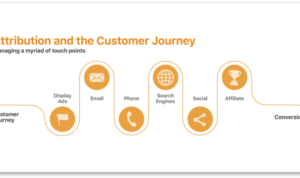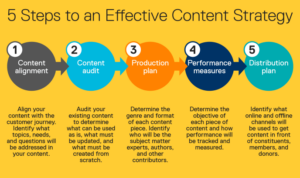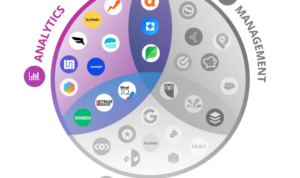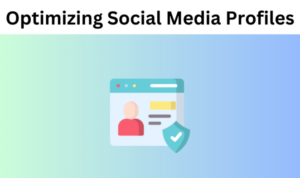Building Online Community Engagement is more than just a buzzword – it’s a vital component for businesses and organizations looking to thrive in the digital age. From creating valuable content to leveraging social media, this guide will explore the key strategies, tools, and analysis needed to foster a thriving online community.
Importance of Building Online Community Engagement
Building online community engagement is crucial for businesses and organizations in today’s digital age. It allows companies to connect with their customers on a more personal level, creating a sense of belonging and loyalty. By fostering a strong online community, businesses can gain valuable insights, feedback, and support from their customers, leading to improved products and services.
Examples of Successful Online Communities
- Reddit: Reddit is a prime example of a successful online community where users can share content, engage in discussions, and connect with like-minded individuals. The platform’s high engagement levels have led to the creation of niche communities (subreddits) that cater to various interests, resulting in a loyal user base.
- Nike Run Club: Nike Run Club is an online community for runners where members can track their runs, set goals, and connect with fellow runners. The active engagement within the community has not only motivated members to stay active but has also strengthened their relationship with the Nike brand.
Impact of Active Community Engagement on Brand Loyalty
Active community engagement plays a significant role in building brand loyalty and customer retention. When businesses interact with their customers regularly, address their concerns, and provide valuable content, customers are more likely to trust the brand and remain loyal. This loyalty translates into repeat purchases, positive word-of-mouth marketing, and a competitive advantage in the market.
Strategies for Building Online Community Engagement

Building online community engagement involves various strategies that can help create a vibrant and active community. Some effective strategies include creating valuable content, fostering discussions, hosting events, and leveraging the power of social media. These strategies can help in building a strong online community and increasing engagement levels among users.
Creating Valuable Content
One of the key strategies for building online community engagement is to create valuable and relevant content that resonates with your target audience. This can include informative articles, engaging videos, interactive polls, and other types of content that add value to the community.
Fostering Discussions, Building Online Community Engagement
Encouraging discussions within the community can help increase engagement levels and create a sense of belonging among members. This can be done by posing thought-provoking questions, responding to comments, and actively participating in conversations to keep the community alive and thriving.
Hosting Events
Organizing online events such as webinars, live Q&A sessions, contests, or virtual meetups can help bring community members together and create opportunities for interaction. These events can help strengthen relationships and foster a sense of community among members.
Role of Social Media
Social media plays a crucial role in building and nurturing online communities. By leveraging social media platforms to promote community activities, share content, and engage with members, you can reach a wider audience and attract new members to the community.
Encouraging User-Generated Content
Encouraging users to create and share their own content, such as user-generated posts, reviews, and testimonials, can help enhance engagement levels within the community. Providing incentives or recognition for user-generated content can motivate members to actively participate and contribute to the community.
Tools and Platforms for Enhancing Community Engagement: Building Online Community Engagement
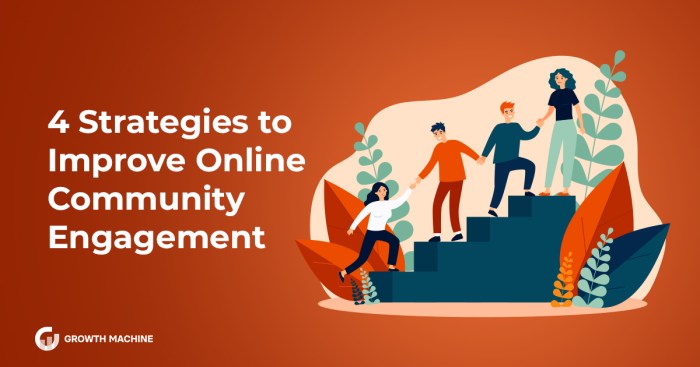
In today’s digital age, there are various tools and platforms available to help manage and grow online communities effectively. These resources can streamline communication, encourage participation, and foster a sense of belonging among community members.
Community Management Platforms
- Social Media Platforms: Social media sites like Facebook, Twitter, Instagram, and LinkedIn are excellent tools for building and engaging with online communities. They allow for real-time interaction, sharing of content, and fostering connections among members.
- Online Forums: Platforms like Reddit, Quora, and Discourse provide a space for community members to ask questions, share knowledge, and engage in discussions on specific topics of interest.
- Community Management Software: Tools like Slack, Discord, and Hootsuite offer features for managing community communication, organizing events, scheduling posts, and tracking analytics.
Automation Tools for Community Engagement
- Email Marketing Automation: Platforms like Mailchimp, Constant Contact, and HubSpot allow for automated email campaigns to keep community members informed about events, updates, and relevant content.
- Social Media Scheduling Tools: Tools such as Buffer, Hootsuite, and Sprout Social enable community managers to schedule posts in advance, maintain a consistent online presence, and engage with followers across different time zones.
- Chatbots: Chatbots like ManyChat, Drift, and Intercom can provide instant responses to common queries, facilitate user interactions, and gather valuable feedback from community members.
Measuring and Analyzing Community Engagement
Community engagement is a crucial aspect of building a strong online community. To ensure that your community is thriving, it is essential to measure and analyze the levels of engagement effectively. By tracking key metrics, understanding community needs through feedback loops and surveys, and optimizing strategies based on data analysis, you can enhance the overall engagement of your community.
Key Metrics to Track Community Engagement Levels
- Number of active members: Monitor the number of active participants in your community to gauge the level of engagement.
- Engagement rate: Calculate the percentage of members who actively participate in discussions, share content, or interact with others.
- Response time: Measure how quickly community members respond to posts or queries, indicating their level of engagement.
Importance of Feedback Loops and Surveys
Feedback loops and surveys play a vital role in understanding the needs and preferences of your community. By gathering feedback directly from members, you can identify areas for improvement, address concerns, and tailor your community-building efforts to meet their expectations.
Best Practices for Analyzing Engagement Data
- Set clear goals: Define specific objectives for community engagement and align your analysis with these goals.
- Use analytics tools: Utilize tools like Google Analytics, social media insights, or community platforms to track engagement metrics accurately.
- Segment data: Break down engagement data by demographics, behavior, or content to identify patterns and tailor strategies accordingly.







